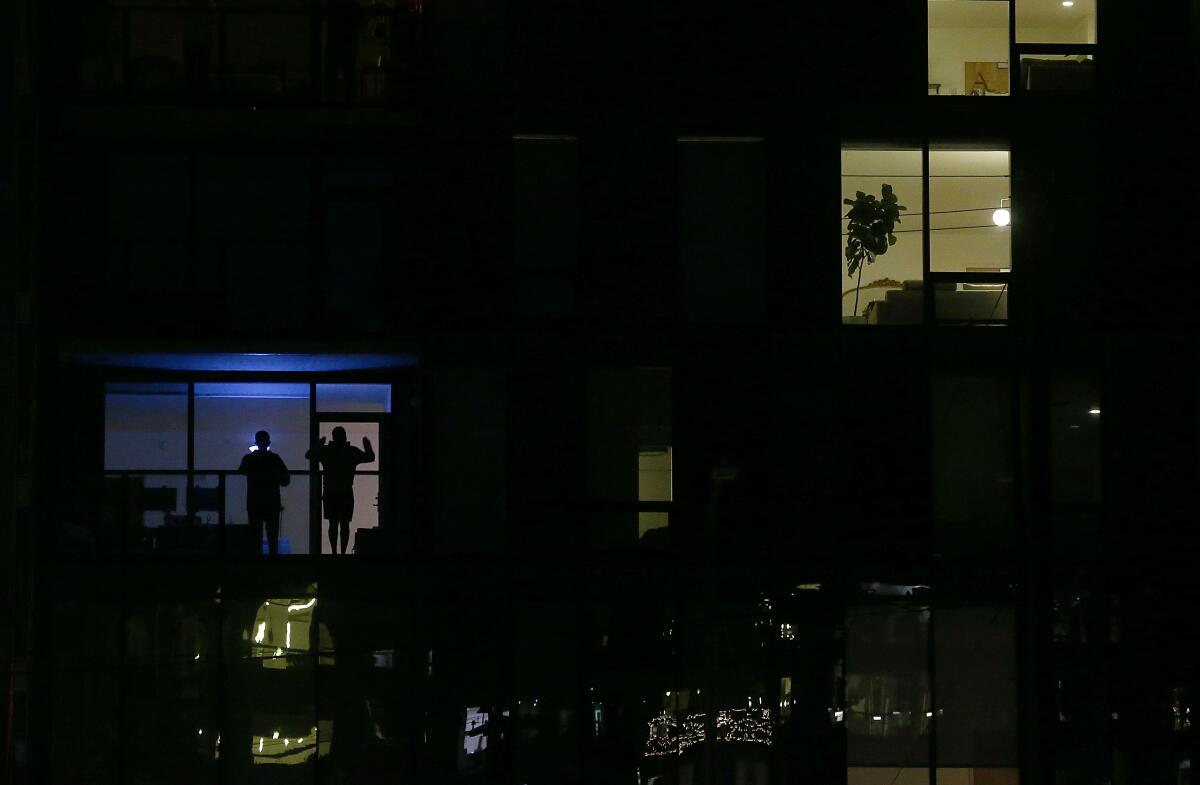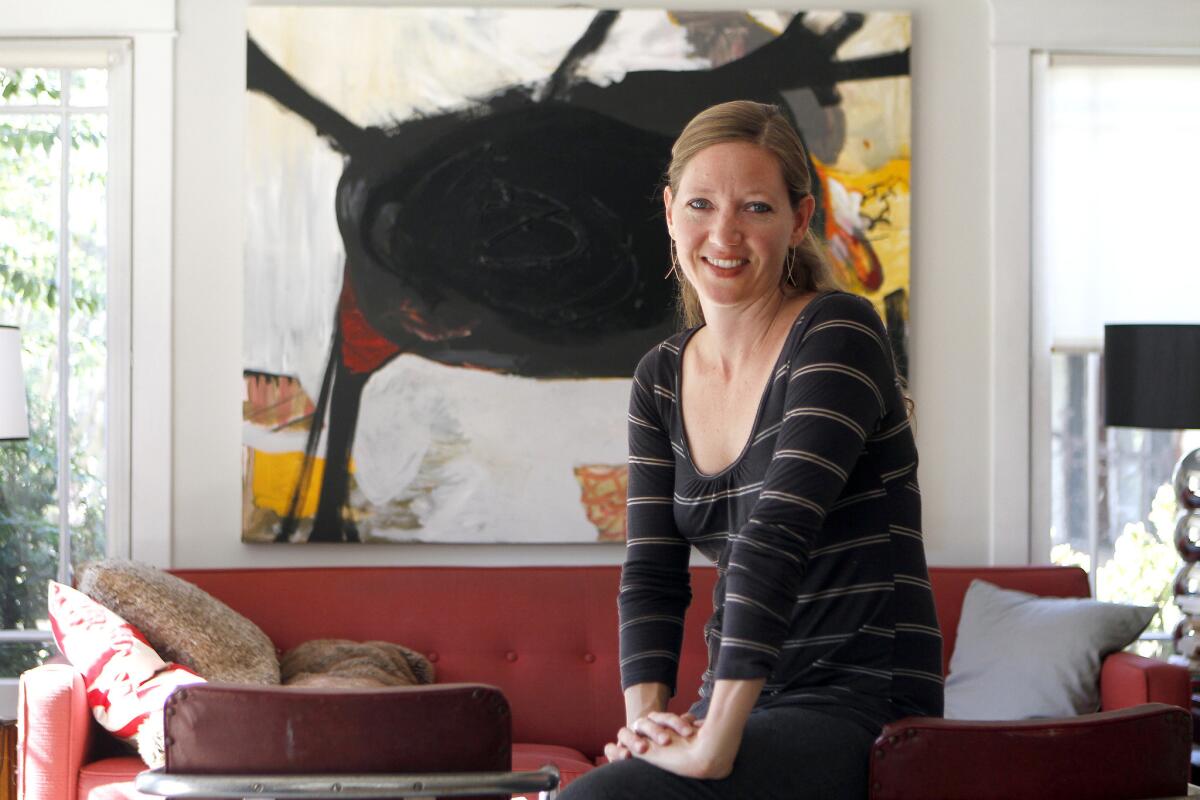Against consolation: Reading dark materials in COVID-19 quarantine

- Share via
Back in March, during the earliest days of the shutdown, I could not bring myself to read. Everything seemed inchoate, irrelevant or out of date. What I wanted was a guide for living. What I wanted were tips on how to make it through. What I wanted were assurances, a sense that everything was going to be OK. This, however, is not the purpose of narrative, which insists on a more rigorous perspective. We don’t read or write to be reassured — at least I don’t. We read and write to reckon with all the things we cannot know.
“There is a kind of uniform monotony in the fate of man,” Natalia Ginzburg observes in her essay “Winter in the Abruzzi.” She is referring not to our time but to hers. In 1941, Ginzburg’s husband was sent into internal exile in Italy because he was an anti-fascist; she and their children accompanied him. I had never encountered “Winter in Abruzzi” until I read about it in “The New Calm,” a recent New Yorker piece by Maggie Nelson about her experience of the pandemic. What Ginzburg is evoking is the futility of empty hope, which seems especially appropriate now.
I experienced the Nelson and Ginzburg pieces during a binge some weeks ago that broke the logjam in my reading. All of a sudden, I was ready — not to be distracted but to engage. Unsurprisingly, I turned first to essays, that interrogatory genre in which we confront a consciousness in conversation with itself.
I don’t mean to be glib when I suggest this represents its own form of contagion: The writer’s voice and situation infiltrating ours. Take Leslie Jamison, whose account of her bout with the virus, “Since I Became Symptomatic,” I also read during my spree. “It’s as if the quarantine keeps inching closer and closer to my insides,” Jamison tells us, distancing herself before coming closer. “First I lost the touch of other bodies; then I lost the air; now I’ve lost the taste of bananas. Nothing about any of these losses is particularly unique.”
Authors like Lionel Shriver, Alexander McCall Smith, Laura Lippman and Steph Cha are under coronavirus quarantine too. Here’s what they’re reading.
I’ve carved a passage back to reading by discovering new reflections on life under the duress of quarantine or illness, while also revisiting older works that affirm for me a related point, which should be obvious — that nothing is unprecedented, even if it feels that way. What I mean is, disorder and plague are always with us. “[W]e’re all just a breath away from the end of our lives,” Jenny Diski wrote in her 2016 memoir, “In Gratitude,” one of the books I’ve been rereading. She was reporting back from the personal apocalypse of a terminal cancer diagnosis, but like Ginzburg and Nelson and Jamison, she can’t help but speak of something larger than herself.

I resist the notion that literature should have to teach us anything, that it must necessarily be of use. All the same, stories are (How can they not be?) connective, part of a collective narrative. That seems especially essential now that we find ourselves in isolation, not only physically but also emotionally. I remember how, as an adolescent, the books I read, and the people I met there, felt as real to me (or realer) than those with whom I dealt every day. Escape? Perhaps, but I prefer to think of it as a deeper engagement, a conversation across space and time. We are alone, yes, but there is togetherness — if only in the fact that we are all laboring under the same condition, which is the frailty and uncertainty of being human.
Not long ago, via email — or was it Zoom or Skype? — a friend commented that she missed Los Angeles. “I miss it too,” I responded, looking at the street outside my window, where I have lived for the last 15 years. There it was, on the other side of the glass, like a scene from a life that no longer belonged to me. It brought to mind Addie Bundren, the dying matriarch who catalyzes William Faulkner’s “As I Lay Dying,” “quilt … drawn up to her chin, hot as it is, with only her two hands and her face outside,” watching through her own window as her son Cash builds the coffin in which she will be committed to the void.
“As I Lay Dying” is another work to which I keep returning, not because it offers easy solace but because it does not. Faulkner makes that clear from his first description of Addie: “Her eyes are like two candles when you watch them gutter down into the sockets of iron candle-sticks. But the eternal and the everlasting salvation and grace is not upon her.”
The portrait is astonishing; even as she faces the inevitable, she is not willing to let go. It brings to mind a similar moment toward the end of “In Gratitude,” in which Diski listens as another patient wails in terror. “[S]he’s not ready,” a nurse explains. “She hasn’t thought enough about it and now it’s very hard for her.” The inference is that there’s work to be done, some preparation to ease our passage. But the truer lesson may be that readiness is immaterial, that acceptance is what we require. To imagine otherwise is a sentimental fantasy, which is a luxury we cannot (Could we ever?) afford.
Emily St. John Mandel chronicles a global pandemic and financial crisis in her novels, ‘Station Eleven’ and ‘The Glass Hotel.’
Don’t get me wrong: I understand the temptation. One might even say going back to old books, ones I know and love already, is as sentimental as it gets. There is a comfort in going back to what we imagine was once normal, even as we know that, by the time we emerge from isolation, normal will have become something else. In the meantime, we watch old movies, old TV shows, we listen to the music of our youth. And yet, those memories have a double effect, rooting and dislocating us at once. We can’t go back; we can never go back. This is the world we live in now. “What I mean to say,” Emily St. John Mandel writes in “Station Eleven,” a novel about a pandemic that decimates humanity, “is the more you remember, the more you’ve lost.”
Of course, as Jamison’s pandemic essay means to tell us, we were never truly isolated to begin with; it’s one reason “As I Lay Dying” has 15 narrators, a kaleidoscope of voices sprawling across the nine days of toil and trouble it takes to get Addie’s body in the ground. Diski understood that too, tracking the progression of her illness not because she imagined it might save her but because she knew it would not. It’s this clarity I want as a reader. It’s this I aspire to when I write. What I’m referring to is resilience. What I’m referring to is perseverance, which has been our most defining aspect all along.
Much of the time, we can get away with holding such a notion at a distance. Now, however, we are face to face with it. “How often,” Faulkner writes, “have I lain beneath rain on a strange roof, thinking of home.” It’s an open-ended question, but in its specificity — rain on a strange roof? — it offers something sustaining: a sense of what it means to live each moment on its own terms, and a reminder that in a time that feels unmapped and raw, we have been here before.
Ulin is a former book editor and book critic of The Times.
Emily St. John Mandel, Susan Orlean, T.C Boyle, Marlon James and others share apocalypse reading picks.
More to Read
Sign up for our Book Club newsletter
Get the latest news, events and more from the Los Angeles Times Book Club, and help us get L.A. reading and talking.
You may occasionally receive promotional content from the Los Angeles Times.








